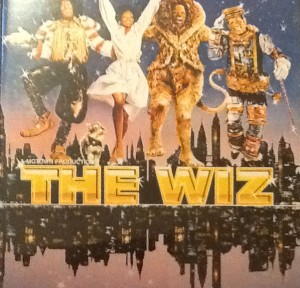I swear, the things I find in weekend reading.
I saw a headline in my daily e-blast from The Root about a high school doing a stage production of “The Wiz” with no African Americans in the cast. (Maybe some members of the cast are another “other?” School officials claim here that there’s diversity in the cast.) Black students are boycotting, but theater folks at other schools say blind casting is the way. To quote one from the same article, “You don’t cast for a show based on the color of someone’s skin or someone’s sex. You cast for who can pull off the role.â€
I have  mixed feelings about that utopic sentiment. A couple of years ago I heard a Filipino playwright in town for the Humana Festival say she was studying acting at NYU but got into playwriting because she wasn’t getting any acting experience. NYU didn’t believe in casting minorities in Shakespearean productions or in anything that didn’t specify a character’s race. When there was a minority specified, she played it—any minority. She had been Jamaican, Chinese and Hispanic, also, whatever dark female character needed. This playwright didn’t want other Filipino actors to be sidelined, so she committed to writing plays that called for Filipino characters and told about the Filipino-American experience.

Media pic from “How Orisanmi Chose His Head,” a production by UofL’s African American American Theatre Program. The play is set in Nigeria.Â
Black playwrights have done the same. I haven’t read “The Wiz,” so I don’t know if the descriptions of characters, which are normally found in the opening pages of the published text, is specified. But as other descriptions of the play and the movie have indicated, the production speaks to the African American experience. Can you perform the African American experience without African Americans? I’ve concluded it depends on the show. “The Wiz,” especially the stage version, which still has Dorothy on a farm, the African American experience is about the music more than anything else. Nobody is going outdo Stephanie Mills, but if you can hit the notes, I’m open to blind casting.
But then are shows like A Raisin in the Sun, The Story or Intimate Apparel, in which there’s tension between blacks and whites. Or ones like Jitney, Blues for an Alabama Sky, The Colored Museum, Cage Rhythm or Top Dog/Underdog, in which race and racism have affected the characters even when contact with whites on the stage is pleasant or entirely absent. Blind casting, ideal as it may seem, would seem odd, insulting or like yet another attempt by whites to mimic black work and culture or to claim it as their own.
From what I gather, the controversy at this Syracuse High School is more about their school (and hence, maybe their neighborhood or city) not having enough black people to pull off a diverse cast than it is about purposely excluding black students or being all noble and colorblind when you cast a show. But because there are still racially segregated schools that have enough money for theater productions, I thought I would offer some rules for blind casting in post-racial, 21st century, politically correct, diversity-driven, equality-loving America:
- Blind casting is okay when they play isn’t about race, in any way. (Good luck finding plays about the non-white American experience without that.)
- Blind casting is okay when the casting descriptions don’t specify race. (Please note this rule is not infallible; Susan Lori Parks specifies no physical characteristics in the character list of Top Dog/Underdog.)
- It’s okay when non-white actors are cast in roles that might normally be considered only for white people. Juliet can be black. Hamlet can be Korean. Glenda and Elfaba can both be black, since the point is that Elfaba is green. In the best live production of Les Mis I’ve ever seen, Jean Valjean was black. I’ve also seen a fantastic black Fantine.
- In most cases, ignore what dude said about not casting based on sex. Nothing deep here. It will be a good experience for the actors, but rarely for the audience.Â
There is one wonderful thing about colorblind casting at the high school level: It exposes white children to playwrights who aren’t white, and to an American experience that may or may not be theirs. They would miss out on some wonderful work if their casting were limited to the race of the student body.


Enjoyable post as always, Miss Mariam. I just thought I’d add one thing to your first point: “1. Blind casting is okay when they play isn’t about race, in any way. (Good luck finding plays about the non-white American experience without that.)”
If people truly paid attention to work by white playwrights, race is all over the American canon. It’s in asides about “darkies” in Tennessee Williams. It’s in the Greek, Polish, Irish, or Italian immigrant, torn between their aspirations and their home communities (and either or both of those poles might have racists). Oh, and I beg of you to retire the phrase “about race.” Fences is about a black family in a racist moment in history. The play is about that family. It is not “about race.” I’m not even sure what that phrase is supposed to mean. I suppose there are some plays that are “about racISM”–but those usually aren’t good. It’s a pet peeve of mine to see any story in which the characters aren’t white reduced to being “about race”–again, whatever that phrase is supposed to mean. Yes, I have a bee in my bonnet about that phrase. Thanks for listening (smile).
That bee is stinging you upside the head! (smile)
Here’s what I mean in this post (and previously deleted for the sake of brevity) by “about race”: a play in which neither the characters’ race—no matter what it is—nor racism have anything to do with where the characters are at the point in their staged lives. Diversity for the sake of diversity probably works in High School Musical (can’t be sure, as I haven’t seen it). I’ve seen black people cast as the neighbors in Arthur Miller’s All My Sons, and it didn’t work because segregation would have prevented a middle-class black family from living next door to a middle-class (or are they upper?) white family. As you pointed out with Fences, in all of August Wilson’s plays, black families in Pittsburgh wouldn’t have been in some of the situations Wilson wrote about if they hadn’t been black families. But each play is about the families.